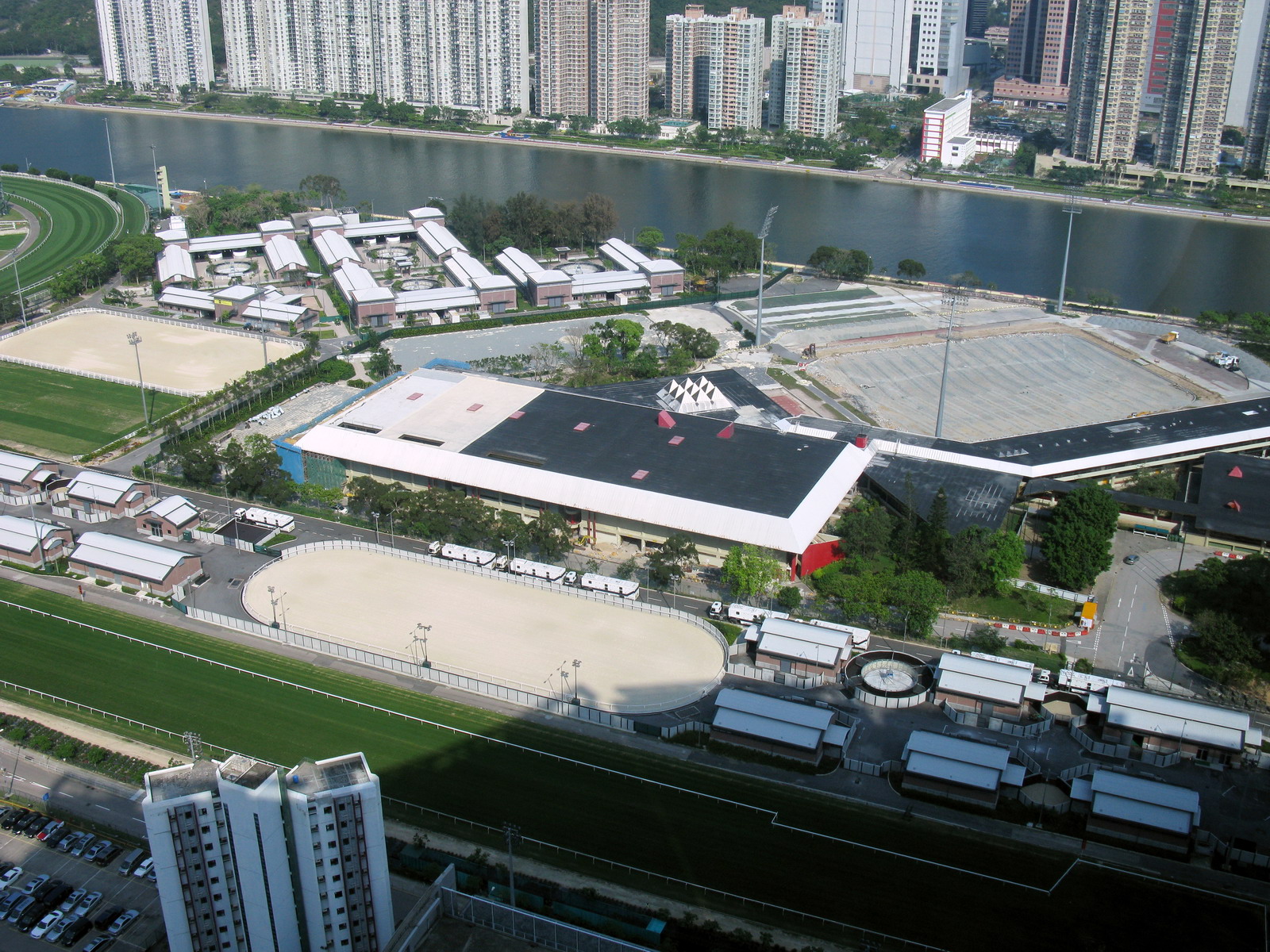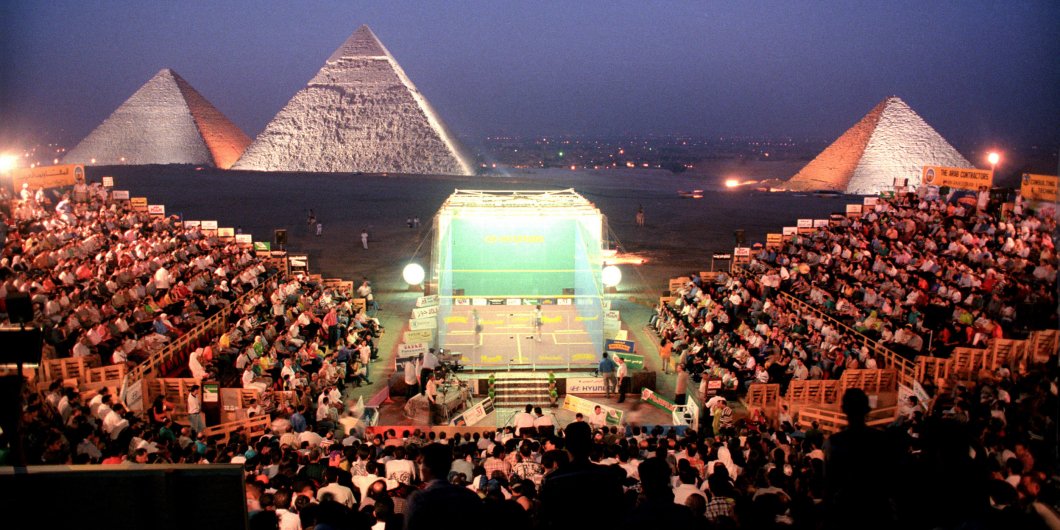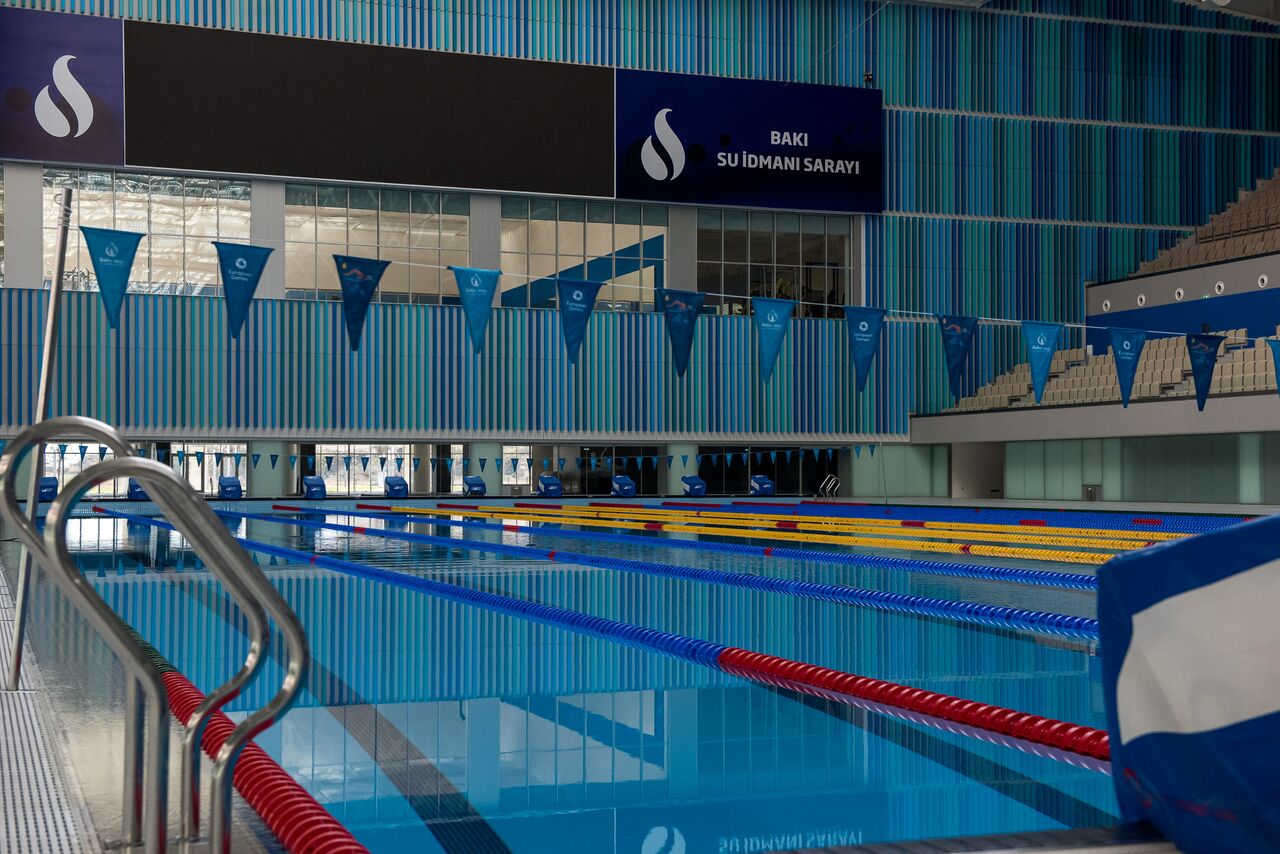|
Hong Kong Equestrian Venues
The Hong Kong Sports Institute () is a sports institute located in Sha Tin, New Territories, Hong Kong. It is mandated to provide training to athletes, and also offers academic qualification in the field of sports training. The institute sponsors elite athletes and trains them as full-time employees, based on their talent and potential. The campus is located on reclaimed land on the bank of the Shing Mun River, next to the Sha Tin Racecourse. History The institute, then called the Jubilee Sports Centre (JSC), was envisioned to provide "top class coaching and training for promising and outstanding" athletes, with an emphasis on training young people and in providing a great variety of activities and programmes. The Jubilee Sports Centre Ordinance was enacted in 1977. Sir Alberto Rodrigues, chairman of the JSC Board, stated in 1977, "we do not see any sports excluded" and explained that the aim was to improve sports standards in the territory and that the centre would seek out ... [...More Info...] [...Related Items...] OR: [Wikipedia] [Google] [Baidu] |
Sha Tin
Sha Tin, also spelt Shatin, is a neighbourhood along Shing Mun River in the eastern New Territories, Hong Kong. Administratively, it is part of the Sha Tin District. Sha Tin is one of the neighbourhoods of the Sha Tin New Town project. The new town was founded in 1973 under the New Towns Development Programme of the Hong Kong government. Its current name was named after the nearby village of Sha Tin Wai. The literal English translation is 'Sand Fields'. History Tai Wai Village, located in Tai Wai, next to Sha Tin, and the oldest and largest walled village in Sha Tin District, was built in 1574, during the Ming Dynasty. Before British rule in Hong Kong, the area of Sha Tin and its vicinity was referred to as Lek Yuen (lit. "source of trickling" or "source of clear water"). Colonial officials allegedly mistook the name of the Sha Tin Wai village as the name of the area and it has been used ever since. Nowadays, the original name is used to refer to Lek Yuen Estate. T ... [...More Info...] [...Related Items...] OR: [Wikipedia] [Google] [Baidu] |
Hong Kong Jockey Club
The Hong Kong Jockey Club (HKJC) is one of the oldest institutions in Hong Kong, having been founded in 1884. In 1959, it was granted a Royal Charter and renamed The Royal Hong Kong Jockey Club (). The institution reverted to its original name in 1996 due to the transfer of sovereignty of Hong Kong in 1997. Membership of the club is by nomination and election. It is a non-profit organisation providing horse racing, sporting and betting entertainment in Hong Kong. It holds a government-granted monopoly in providing pari-mutuel betting on horse racing, the Mark Six lottery, and fixed odds betting on overseas football events. The organisation is the largest taxpayer in Hong Kong, as well as the largest community benefactor. The Hong Kong Jockey Club Charities Trust donated a record HK$3.6 billion in 2014 to support the different needs of the society and contribute to the betterment of Hong Kong. The club also proactively identifies, funds and develops projects which antic ... [...More Info...] [...Related Items...] OR: [Wikipedia] [Google] [Baidu] |
Badminton
Badminton is a racquet sport played using racquets to hit a shuttlecock across a net. Although it may be played with larger teams, the most common forms of the game are "singles" (with one player per side) and "doubles" (with two players per side). Badminton is often played as a casual outdoor activity in a yard or on a beach; formal games are played on a rectangular indoor court. Points are scored by striking the shuttlecock with the racquet and landing it within the opposing side's half of the court. Each side may only strike the shuttlecock once before it passes over the net. Play ends once the shuttlecock has struck the floor or if a fault has been called by the umpire, service judge, or (in their absence) the opposing side. The shuttlecock is a feathered or (in informal matches) plastic projectile which flies differently from the balls used in many other sports. In particular, the feathers create much higher drag, causing the shuttlecock to decelerate more rapidly. S ... [...More Info...] [...Related Items...] OR: [Wikipedia] [Google] [Baidu] |
Boccia
Boccia ( ) is a precision ball sport, similar to bocce, and related to bowls and pétanque. The name "boccia" is derived from the Latin word for "boss" – '. The sport is contested at local, national and international levels, by athletes with severe physical disabilities. It was originally designed to be played by people with cerebral palsy but now includes athletes with other severe disabilities affecting motor skills. In 1984, it became a Paralympic sport and as of 2020, 75 boccia national organizations have joined one or more of the international organizations. Boccia is governed by the Boccia International Sports Federation (BISFed) and is one of only two Paralympic sports (along with goalball) that have no counterpart in the Olympic program. About the game Boccia can be played by individuals, pairs, or teams of three. All events are mixed gender. The aim of the game is to throw leather balls — coloured red or blue (which side uses which is determined by a co ... [...More Info...] [...Related Items...] OR: [Wikipedia] [Google] [Baidu] |
Bowling
Bowling is a target sport and recreational activity in which a player rolls a ball toward pins (in pin bowling) or another target (in target bowling). The term ''bowling'' usually refers to pin bowling (most commonly ten-pin bowling), though in the United Kingdom and Commonwealth countries, bowling could also refer to target bowling, such as lawn bowls. In pin bowling, the goal is to knock over pins on a long playing surface known as a ''lane''. Lanes have a wood or synthetic surface onto which protective lubricating oil is applied in different specified oil patterns that affect ball motion. A strike is achieved when all the pins are knocked down on the first roll, and a spare is achieved if all the pins are knocked over on a second roll. Common types of pin bowling include ten-pin, candlepin, duckpin, nine-pin, and five-pin. The historical game skittles is the forerunner of modern pin bowling. In target bowling, the aim is usually to get the ball as close to a ma ... [...More Info...] [...Related Items...] OR: [Wikipedia] [Google] [Baidu] |
Squash (sport)
Squash is a racket-and- ball sport played by two or four players in a four-walled court with a small, hollow, rubber ball. The players alternate in striking the ball with their rackets onto the playable surfaces of the four walls of the court. The objective of the game is to hit the ball in such a way that the opponent is not able to play a valid return. There are about 20 million people who play squash regularly world-wide in over 185 countries. The governing body of Squash, the World Squash Federation (WSF), is recognized by the International Olympic Committee (IOC), but the sport is not part of the Olympic Games, despite a number of applications. Supporters continue to lobby for its incorporation in a future Olympic program. The Professional Squash Association (PSA) organizes the pro tour. History Squash has its origins in the older game of rackets which was played in London's prisons in the 19th century. Later, around 1830, boys at Harrow School noticed that a punctured ... [...More Info...] [...Related Items...] OR: [Wikipedia] [Google] [Baidu] |
P & T Architects & Engineers Ltd
P&T Group (), formerly known as Palmer and Turner Hong Kong (Chinese: 公和洋行; "Kung Wo Yeung Hong"), is an architectural firm in Hong Kong. It is one of the oldest architecture and engineering firms in the world, and it has designed many landmark buildings in Hong Kong, Shanghai and in southeast Asia. History Based in Hong Kong, P&T claims its roots when architect William Salway set up his own practice on 1 October 1868. Herbert William Bird, a partner of the firm from 1901 to 1928, was also a member of the Legislative Council of Hong Kong. Hong Kong public records suggest that Palmer & Turner arose out of Palmer & Bird – a prominent firm at the time whose senior partner was Lennox Godfrey Bird, younger brother of HW Bird. It is known that Clement Palmer, then only 23 years of age, designed the first Hong Kong and Shanghai Bank Building in 1883. Arthur Turner, a structural engineer, joined the firm in 1884. From 1891 onwards, the name Palmer and Turner was kept, despite ... [...More Info...] [...Related Items...] OR: [Wikipedia] [Google] [Baidu] |
Chinese Martial Arts
Chinese martial arts, often called by the umbrella terms kung fu (; ), kuoshu () or wushu (), are multiple fighting styles that have developed over the centuries in Greater China. These fighting styles are often classified according to common traits, identified as "families" of martial arts. Examples of such traits include '' Shaolinquan'' () physical exercises involving All Other Animals () mimicry or training methods inspired by Old Chinese philosophies, religions and legends. Styles that focus on qi manipulation are called ''internal'' (; ), while others that concentrate on improving muscle and cardiovascular fitness are called ''external'' (; ). Geographical association, as in ''northern'' (; ) and ''southern'' (; ), is another popular classification method. Terminology ''Kung fu'' and ''wushu'' are loanwords from Cantonese and Mandarin respectively that, in English, are used to refer to Chinese martial arts. However, the Chinese terms ''kung fu'' and ''wushu'' (; ) ... [...More Info...] [...Related Items...] OR: [Wikipedia] [Google] [Baidu] |
Olympic-size Swimming Pool
An Olympic-size swimming pool conforms to regulated dimensions that are large enough for international competition. This type of swimming pool is used in the Olympic Games, where the race course is in length, typically referred to as "long course", distinguishing it from "short course" which applies to competitions in pools that are in length. If touch panels are used in competition, then the distance between touch panels should be either 25 or 50 metres to qualify for FINA recognition. This means that Olympic pools are generally oversized, to accommodate touch panels used in competition. An Olympic-size swimming pool is used as a colloquial unit of volume, to make approximate comparisons to similarly sized objects or volumes. It is not a specific definition, as there is no official limit on the depth of an Olympic pool. The value has an order of magnitude of 1 megaliter (ML). Specifications FINA specifications for an Olympic-size pool are as follows: There must be two spa ... [...More Info...] [...Related Items...] OR: [Wikipedia] [Google] [Baidu] |
Tseung Kwan O New Town
Tseung Kwan O New Town is one of the nine new towns in Hong Kong, built mainly on reclaimed land in the northern half of Junk Bay (known as Tseung Kwan O in Chinese/Cantonese language) in southeastern New Territories, after which it is named. The town/land area is usually known simply as Tseung Kwan O. Development of the new town was approved in 1982, with the initial population intake occurring in 1988. As of 2016, the town is home to around 396,000 residents. The total development area of Tseung Kwan O, including its industrial estate, is about , with a planned population of 445,000. Major residential neighbourhoods within the new town include Tsui Lam, Po Lam, Hang Hau, Tseung Kwan O Town Centre, Tiu Keng Leng (also known by its English name Rennie's Mill) and Siu Chik Sha, etc. Administratively, the new town belongs to Sai Kung District in southeastern New Territories, although it is often incorrectly regarded as part of Kowloon / New Kowloon due to its close proximity t ... [...More Info...] [...Related Items...] OR: [Wikipedia] [Google] [Baidu] |
Hong Kong Velodrome
Hong Kong Velodrome is a velodrome in Tseung Kwan O, Hong Kong. It has a 250-metre cycling track and spectator facilities for 3,000 people. It opened on 30 December 2013 next to the Tseung Kwan O Sports Ground. History The Hong Kong government agreed to build the velodrome after Wong Kam-po won the gold medal for the men's road race in the 2006 Asian Games at Doha, amid concerns that athletes who represent Hong Kong had to rely on training facilities in China. Construction of the HK$1.1 billion venue got the legislative go-ahead in January 2010 and work began two months later. On 5 November 2012, Chief Secretary Carrie Lam kicked off construction of the Tseung Kwan O Velodrome, as it was then known. The velodrome occupies 6.6 hectares, and cycling helmets inspired its wavy rooftop design. Mrs Lam officiated at the ceremony marking the start of construction. The velodrome officially opened on 30 December 2013. The inaugural international event, the 2014 Hong Kong Intern ... [...More Info...] [...Related Items...] OR: [Wikipedia] [Google] [Baidu] |
Wu Kai Sha
Wu Kai Sha (), formerly known as Wu Kwai Sha or U Kwai Sha (), is a place at the shore of Tolo Harbour, northwest of Ma On Shan in the New Territories, Hong Kong. Wu Kai Sha is within the Sha Tin District, one of the 18 districts of Hong Kong. Administration Wu Kai Sha (including Cheung Kang) is a recognized village under the New Territories Small House Policy. Wu Kai Sha is one of the villages represented within the Sha Tin Rural Committee. For electoral purposes, Wu Kai Sha is part of the Wu Kai Sha constituency, which is currently represented by Li Wing-shing. History Originally there were only a few villages in the area, like Wu Kai Sha Village (). It is now an extension of the Ma On Shan New Town. At the time of the 1911 census, the population of Wu Kai Sha Village was 135. The number of males was 59. The vicinity to the northeast is called () in English. The area was once home to the largest of the detention centres for Vietnamese boat people in Hong Kong. Features ... [...More Info...] [...Related Items...] OR: [Wikipedia] [Google] [Baidu] |






.jpg)



